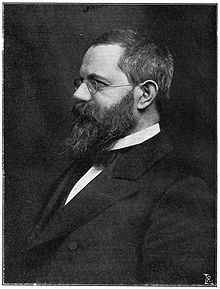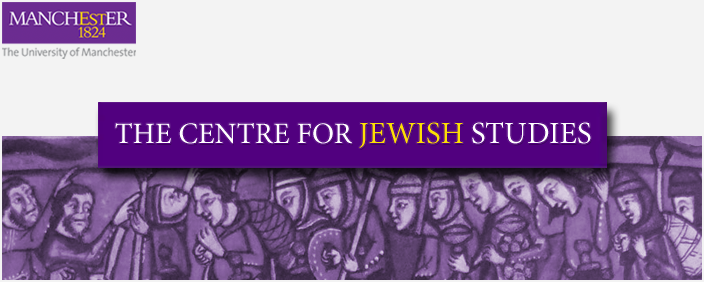Moses Gaster Projects
Dr. Maria Cioată, British Academy Postdoctoral Fellow 2013-18: 'Moses Gaster (1856-1939): Eclectic Collector'
Dr. Katharina Keim, British Academy Postdoctoral Fellow 2015-18: 'The Samaritan Correspondence of Dr Moses Gaster: Texts, Analysis, and Contexts'

Who was Moses Gaster?
Moses Gaster was born in Bucharest (Romania) to a privileged Jewish family in 1856. His mother's name was Phina Judith Rubinstein. His father, Abraham Emanuel Gaster (d. 1926), was the commercial attaché of the Dutch consulate. Gaster went to Germany in 1873 to pursue philological studies at the University of Breslau, which he combined with studying for his Rabbinic degree at the Rabbinic Seminary of Breslau. He defended his doctoral thesis at the University of Leipzig. After his studies, in 1881, he returned to Romania and lectured in Romanian language and literature at the University of Bucharest. He also officiated as an inspector of secondary schools (from 1883) and an examiner of teachers (from 1884). Besides this he was active in various Jewish Societies, such as the Jewish Colonization Society and the Council of the Society for the Publication of Jewish School Books. His activism on behalf of the Jewish population, particularly his insistence that the government should implement article 44 of the Treaty of Berlin (1878) granting full citizenship to non-Christians, led to his expulsion from Romania in 1885. The decree of expulsion was later rescinded, and Gaster received the Rumanian order ‘Pour le Merite’ (first class) in 1891, and in 1929 he became an honorary member of the Romanian Academy. However, he did not return to Romania for residency.
 After his expulsion he settled in England. In 1887 he was appointed to the position of Haham (roughly equivalent to Chief Rabbi) of the Sephardic community of the British Empire, a role which he fulfilled until 1918. Gaster maintained an interest in education, which was demonstrated by the gusto with which he took up his appointment as the principal of the Lady Judith Montefiore College at Ramsgate (1888–1896), an institution which he tried to transform into a Rabbinic seminary. It left him deeply embittered when his dream of putting the Montefiore College on the map of European Jewish education ended in bitter conflicts between himself and the Sephardi establishment – an episode which nearly cost him his position as Haham as well. After the closure of the college he rededicated much of his energy to Zionism (to which he had already been committed in Romania). He was among the founders of the English Zionist Federation in 1899.
After his expulsion he settled in England. In 1887 he was appointed to the position of Haham (roughly equivalent to Chief Rabbi) of the Sephardic community of the British Empire, a role which he fulfilled until 1918. Gaster maintained an interest in education, which was demonstrated by the gusto with which he took up his appointment as the principal of the Lady Judith Montefiore College at Ramsgate (1888–1896), an institution which he tried to transform into a Rabbinic seminary. It left him deeply embittered when his dream of putting the Montefiore College on the map of European Jewish education ended in bitter conflicts between himself and the Sephardi establishment – an episode which nearly cost him his position as Haham as well. After the closure of the college he rededicated much of his energy to Zionism (to which he had already been committed in Romania). He was among the founders of the English Zionist Federation in 1899.
A significant number of Gaster's philological publications was produced in the 1880s and 1890s. Many of his publications were editions and studies of a wide range of texts, including European folklore, and Jewish and Christian literature from antiquity to the Middle Ages. Examples include: Literatura Populară Română (1883) and Chrestomatie Română (1891), Romanian Apocalypse of Abraham (1887), Ilchester Lectures on Greco-Slavonic Literature (1887), ‘Hebrew Visions of Hell and Paradise’ (1893), The Sword of Moses (1896) and The Chronicles of Jerahmeel (1899). In spite of his increasingly deteriorating eyesight, Gaster continued to publish throughout his life. His later books include The Exempla of the Rabbis (1924), The Samaritans: their History, Doctrines and Literature (1925, Schweich Lectures of 1923), Asatir, the Samaritan Book of the Secrets of Moses (1927) and Maaseh Book of Jewish Tales and Legends (1934). He also wrote many articles for newspapers and magazines on a great variety of subjects.
Gaster married Lucy Friedlander (1871–1940), the daughter of Michael Friedlander (1833–1910; principal of Jews' College) in 1890. They had a large family, with seven sons and six daughters (plus two sons who died in infancy). Their eldest daughter, Phina Emily, married judge Neville Laski (1890–1969). Another daughter, Irene, became a pioneering social worker. She moved to Israel, where she established the first care centre for mentally disabled children. A son, Theodor (1906–1992), was a scholar in biblical and ancient Near Eastern studies. He settled in the USA and published on topics such as the Dead Sea Scrolls and myths in the Hebrew Bible. Another son, Jack (1907–2007), was a solicitor and communist activist. Moses Gaster died of a heart attack on 5 March 1939. He was buried in the Hendon cemetery of the Spanish and Portuguese Jews, north-west London.
Dr. Maria Cioată: Moses Gaster (1856-1939): Eclectic Collector
Moses Gaster (Haham, roughly the equivalent of chief rabbi of the British Sephardic community 1887–1918) was a widely published polymath. His areas of expertise included folklore, apocrypha and pseudepigrapha, magic and mysticism, Samaritanism, and Romanian philology. He showed a keen interest in what can be described as ‘marginal literature’. The title ‘eclectic collector’ refers to Gaster as a collector of objects (mainly books and manuscripts), and to an important aspect of his scholarship. Some of the texts he published he found in collections of literature, such as the medieval Slavonic Paleia. Many of his books, such as Chrestomatie Română (1891), Chronicles of Jerahmeel (1899), Romanian Bird and Beast Stories (1915) and Exempla of the Rabbis (1924) are collections of stories which he gathered from different sources. The project has a dual purpose: to evaluate Gaster’s identity as a collector (based on a careful examination of his collection of books, manuscripts and other items such as amulets), and to assess his scholarship, particularly by examining his work related to collections of narratives. The project contributes to the history of scholarship in Gaster’s fields and to the study of the role of collecting in establishing identity.
This project follows on from a previous related project with Dr. Maria Cioată (Haralambakis) at Manchester entitled 'Moses Gaster's contribution to Jewish Studies: A case-study of his work in the Apocrypha, the Pseudepigrapha, folklore, magic and mysticism'. This first project, which received funding from any anonymous European foundation for one academic year (2011-12), attempted to reassess Gaster’s scholarship in order to restore him to his place in the history of scholarship. It also aimed to increase the bibliographic control of the whole Gaster library, which has been distributed over various institutions, including the John Rylands University Library in Manchester (archival material, Hebrew, Samaritan and miscellaneous manuscripts, Genizah fragments, amulets, work by Gaster), British Library (mainly Hebrew manuscripts), Romanian Academy in Bucharest (Romanian manuscripts), University College London (archival material), School of Slavonic and East European Studies (printed books in Romanian and other European languages) and University of California at Los Angeles (printed books in Hebrew). Due to the limited duration of guaranteed funding for the project, the priority was to catalogue the material in the John Rylands University Library in Manchester. Likewise, the evaluation of Gaster’s scholarship the focus for this year will be on a selection rather than attempt to deal with all of his interests. As a scholar Gaster was interested in types of literature, such as magic and mysticism, apocrypha, folklore, and sectarian movements, such as Samaritanism, Karaism and Hasidism which his contemporaries would have considered to be peripheral to the understanding of Judaism. The focus for this project was on Gaster’s scholarship on what could be called ‘non-normative literature’, especially on his work related especially to apocrypha and pseudepigrapha, but also including folklore and magic and mysticism, as these areas seemed to have been strongly interconnected for Gaster.
Dr. Katharina Keim: The Samaritan Correspondence of Dr Moses Gaster: Texts, Analysis, and Contexts
The project will edit, translate, analyze, and contextualize around 500 letters in Samaritan Hebrew that passed between the Jewish scholar Moses Gaster in London and the Samaritan community in Nablus in the years 1904-1933. Gaster was a pioneering scholar of Samaritanism, and the correspondence (now in the John Rylands Library, Manchester) is vital for assessing his contribution to this field, and in particular for evaluating his editions of two important Samaritan texts – the Hebrew version of the Samaritan Joshua and the Asatir, both of which he published for the first time from unique MSS in his possession (now in the Rylands). My main aim is to contribute to the history of Samaritanism through a critique of Gaster’s groundbreaking work. My research will also clarify the motives and methods behind his creation of one of the most important collections of “oriental” MSS assembled in the 20th century, against the backdrop of the desperate attempts of the small Samaritan community to preserve its cultural heritage.
Workshop 1: Gaster’s scholarship in a European context
Maria Cioată has organised a workshop in Manchester 26-27 January 2015 for the preparation of a book provisionally entitled Moses Gaster: the Scholar, his Context and his Legacy. Participants include Irene Zwiep (University of Amsterdam), Marcus Pyka (Franklin University Switzerland), Bogdan Popa (Nicolae Iorga Institute of History, Bucharest), James Renton (Edgehill University), Boaz Huss (Ben Gurion University), and Philip Alexander (University of Manchester). Programme.
Workshop 2
Maria Cioată organised a second workshop at New Europe College, Bucharest, 3-4 June 2015. Participants included Abraham Tal, Stephan Schorch, Eli Yassif, Costin Moisil, Katharina Keim, Philip Alexander, George Brooke, and Bogdan Popa. Programme.
Gaster Collection and his working papers at the John Rylands University Library, Manchester
This box list provides a guide to a specific segment of the wide ranging Gaster collection at The John Rylands Library, part of the University of Manchester, namely the contents of thirteen boxes of 'Gaster Papers'. It is intended to help researchers to search for items of interest in this extensive but largely untapped collection. The box list is a work in progress and descriptions of the first six boxes are at present more detailed than those of boxes seven to thirteen. See also the Gaster collection and a selection of digitized materials from within the collection.
Bibliography
Alderman, Geoffrey. “Gaster, Moses.” Oxford Dictionary of National Biography Online edition (2004).
Alexander, Philip S. “Gaster’s Exempla of the Rabbis: A Reappraisal” in G. Sed-Rajna (ed), Rashi 1040-1990 (Paris: Cerf, 1993), 793-805.
Deletant, Dennis. “A Survey of the Gaster Books in the School of Slavonic and East European Studies Library” in Solanus: Bulletin of the Slavonic and East European Group of SCONUL 10 (1975), 14–23.
Hill, Brad Sabin. “Preface” in The Gaster Collection of Rumanian Printed Books held in the Library of the School of Slavonic and East European Studies (London: 1995).
Renton, James. “Reconsidering Chaim Weizman and Moses Gaster in the Founding-Mythology of Zionism” in M. Berkowitz (ed), Nationalism, Zionism and Ethnic Mobilization of the Jews in 1900 and Beyond (Leiden: Brill, 2004), 129-151.



